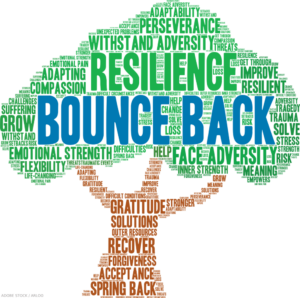 Resilience. That word has been living rent free in my head for the past three weeks. And rent free is a bit of understatement. It all began at the end of a very productive clinic, when the trainee and I sat down to discuss our reflections on the interactions with patients that we’d had in the clinic that day. The trainee mentioned one lady who had “extraordinary resilience” because of the refractory nature of her inflammatory myositis and the challenging socioeconomic circumstances that she had to confront. I understood that this was a laudatory statement full of admiration. It was fundamentally an empathic statement that I believe came from the heart. Yet something else was there—something that inadvertently snuck in between the words—that gave me room to pause.
Resilience. That word has been living rent free in my head for the past three weeks. And rent free is a bit of understatement. It all began at the end of a very productive clinic, when the trainee and I sat down to discuss our reflections on the interactions with patients that we’d had in the clinic that day. The trainee mentioned one lady who had “extraordinary resilience” because of the refractory nature of her inflammatory myositis and the challenging socioeconomic circumstances that she had to confront. I understood that this was a laudatory statement full of admiration. It was fundamentally an empathic statement that I believe came from the heart. Yet something else was there—something that inadvertently snuck in between the words—that gave me room to pause.
Since that time, I’ve been seeing the word resilience everywhere—at least five times a day, at work and at home. Every single time, it provokes some unease. What does resilience even mean in this day and age? What are the assumptions that we make when we use the word resilient? What’s the future of resilience? Let’s rheuminate.
Defining Resilience
In its most literal form—as in the definition in Merriam-Webster’s dictionary—resilience is “the capability of a strained body to recover its size and shape after deformation caused especially by compressive stress.”1 The word seems to be rather ancient, related to the Latin word salire, which means to jump.2 Our modern day usage, with respect to people (“an ability to recover from or adjust easily to misfortune or change”), seems to have been first documented in 1830.
Perhaps a more modern take is in the American Psychological Association’s Dictionary of Psychology (published in 2006): “Resilience is the process and outcome of successfully adapting to difficult or challenging life experiences, especially through mental, emotional, and behavioral flexibility and adjustment to external and internal demands.”3 The entry elaborates: Resilience can be cultivated and practiced. This element of resilience deserves particular emphasis.
These definitions raise more questions, at least in my mind. Clearly, at its core, resilience is about the ability to withstand and recover from adversity. It’s the physiological capacity to cope with adversity and setbacks. But does this mean that resilient people don’t change but rather bounce back? Does resilience imply that we need to falter to succeed? What makes certain people more resilient than others?
Romance of Resilience
Perhaps more important than the literal definitions of resilience are its connotations. In our society, we often romanticize resilience, painting it as a superhero quality that enables individuals to overcome any obstacle. We hold up stories of triumph and resilience as examples to inspire and motivate. And while these stories are undoubtedly powerful and uplifting, we must be cautious not to oversimplify the complex nature of resilience. It’s not a one-size-fits-all solution or a magical elixir that guarantees success in the face of adversity.
